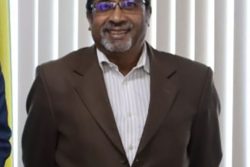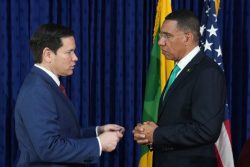Miner Deryck Kanhai, who went berserk last month and shot four people dead before he too was killed, had been granted gun licences by late Police Commissioner Henry Greene even though he was advised against it.
Multiple sources confirmed that the now deceased Greene gave the go ahead for Kanhai to be a licensed firearm holder although there was a recommendation that it should not be granted since he had attempted to take his own life with an unlicensed weapon a year earlier and he was never charged even though police knew that the weapon used was illegal.
On November 12, just after 1pm, Kanhai, for unknown reasons, walked into the Crown Cabs Taxi Service, which operated from the bottom flat of his three-storey 312 Middle Street residence, and attacked several of its employees.
The taxi service’s dispatcher, Vanessa Williams, was reportedly cornered in a bathroom by Kanhai and fatally shot, while a taxi driver was shot twice to the abdomen. He was taken to the Georgetown Hospital, where he remained hospitalised for several days. Based on what this newspaper was told, the taxi driver was shot first and then Williams.
He also managed to shoot and kill 71-year-old Hugh Rowland before retreating into the building, from where he engaged the police in a three-hour stand-off which claimed the lives of Lance Corporal Michael Forde and Constable Sherwin Pantlitz.
After Kanhai’s death, police recovered a shotgun, a .32 pistol and a .22 pistol. Crime Chief Seelall Persaud later told Stabroek News that the miner was not licensed to carry the .22-calibre weapon.
Following the deadly rampage, reports had surfaced that Kanhai had a hot temper and was in the habit of frequently discharging his weapons indiscriminately. Police to date have been unable to properly explain how it was that Kanhai ended up with not one but two firearm licences when he had an established track record of irresponsible behaviour.
A source told Stabroek News that in 2011 Greene signed the approval for Kanhai to be granted a licence after he had made an application. The source said that Greene and other police officials were aware that Kanhai had shot himself in the chin in 2010.
The source said that it was clear on that occasion that the man attempted to take his own life although he had insisted that the gun had gone off accidentally. The source said that what was worse was that the police themselves had acknowledged that the weapon used was illegal. The police in a press release to the media had said that a .357 Magnum revolver and one spent shell were recovered from the scene and that Kanhai was not the holder of a firearm licence.
According to the source, this information along with the fact that there seemed to be some “cover up” with regards to charging Kanhai with illegal possession of a firearm was handed to Greene but was for some reason overlooked as the licences were later granted.
One of Kanhai’s relatives, when contacted, told Stabroek News that the man’s licence was signed by the Commissioner of Police but he could not provide a name. This newspaper was told too that after the shooting the police had asked for the licenses but it is unclear if they were found when the ranks searched Kanhai’s home.
An associate had told this newspaper that he had written several officials and copied his correspondence to the police, after he learned that his friend had applied for and attained the right to legally own guns. He said too that although he and Kanhai were friends and had known each other for decades, he was all too aware of how unpredictable and dangerous the man could be. He recalled the times when Kanhai discharged his weapon in the air in front of his residence and the time he shot himself. He also alleged that several years before he shot himself Kanhai had stabbed one of his brothers, who survived the attack.
In September 2011, after learning that Kanhai was issued with a gun licence, his associate sent an e-mail to the police with the hopes that officials would have done a more thorough investigation of Kanhai’s life. Apparently the police paid no attention to his pleas.
Procedures not being followed
Sources say Kanhai’s case is only one of many in which procedures were not followed by police. One source said that in the majority of cases police do not dig deep into the applicant’s background to ascertain whether they are fit to carry a weapon. It was explained that a person has to first make an application to the police station in their area so that ranks can visit neighbours to ascertain if the person had any temper or displayed signs of irresponsible behaviour.
According to the source, in Kanhai’s case, persons living nearby said that the man would discharge rounds from his home. The source questioned whether police had gone to the area whether in 2011 or subsequently when Kanhai would have asked for a renewal of his licence. If this had been done, the source said, there is a possibility that Kanhai would not have been a licensed firearm holder.
This newspaper was told of cases where ranks do go into areas and talk to neighbours but according to the source this does not happen often enough.
The source said too that it is easy to have licences renewed because again certain procedures are not followed. It was explained that police are supposed to check to see whether a person had any issues with their weapons, whether it be shooting at his/her self, discharging it at someone or threating to use it on someone. The source said that this would clearly show that the person is not fit to be a licensed firearm holder and as such the licence should not be renewed.
However, it was explained that police would advertise when they are selling licenses and all that holders have to do is go and pay the required fee and they would get their licence renewed.
The source agreed that there was need for the urgent review of gun laws as had been signalled by Home Affairs Minister Clement Rohee last week. However, the source opined that laws are there but are just not being followed and enforced by the police.
The source said that had this been done, the Kanhai tragedy may have been prevented.
Rohee, while addressing those attending the opening ceremony of a two-day National Conference for the Prevention of Interpersonal Violence, had said that he would approach the president in relation to a review of the laws and had expressed concern about the demand for weapons.








